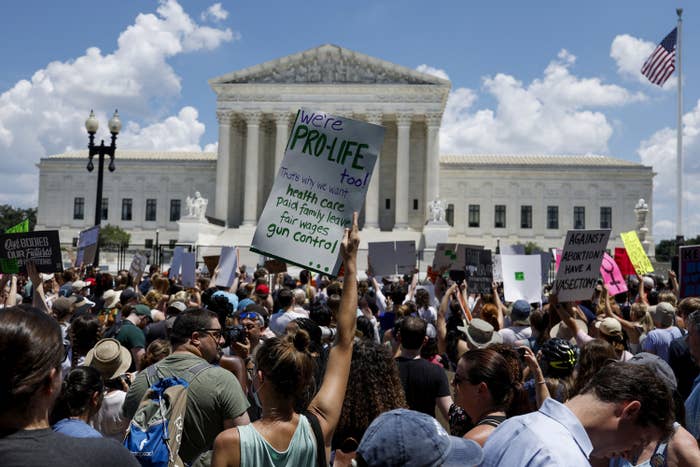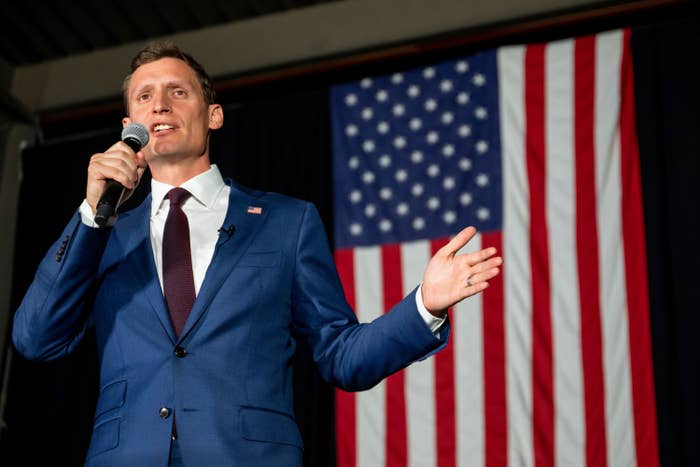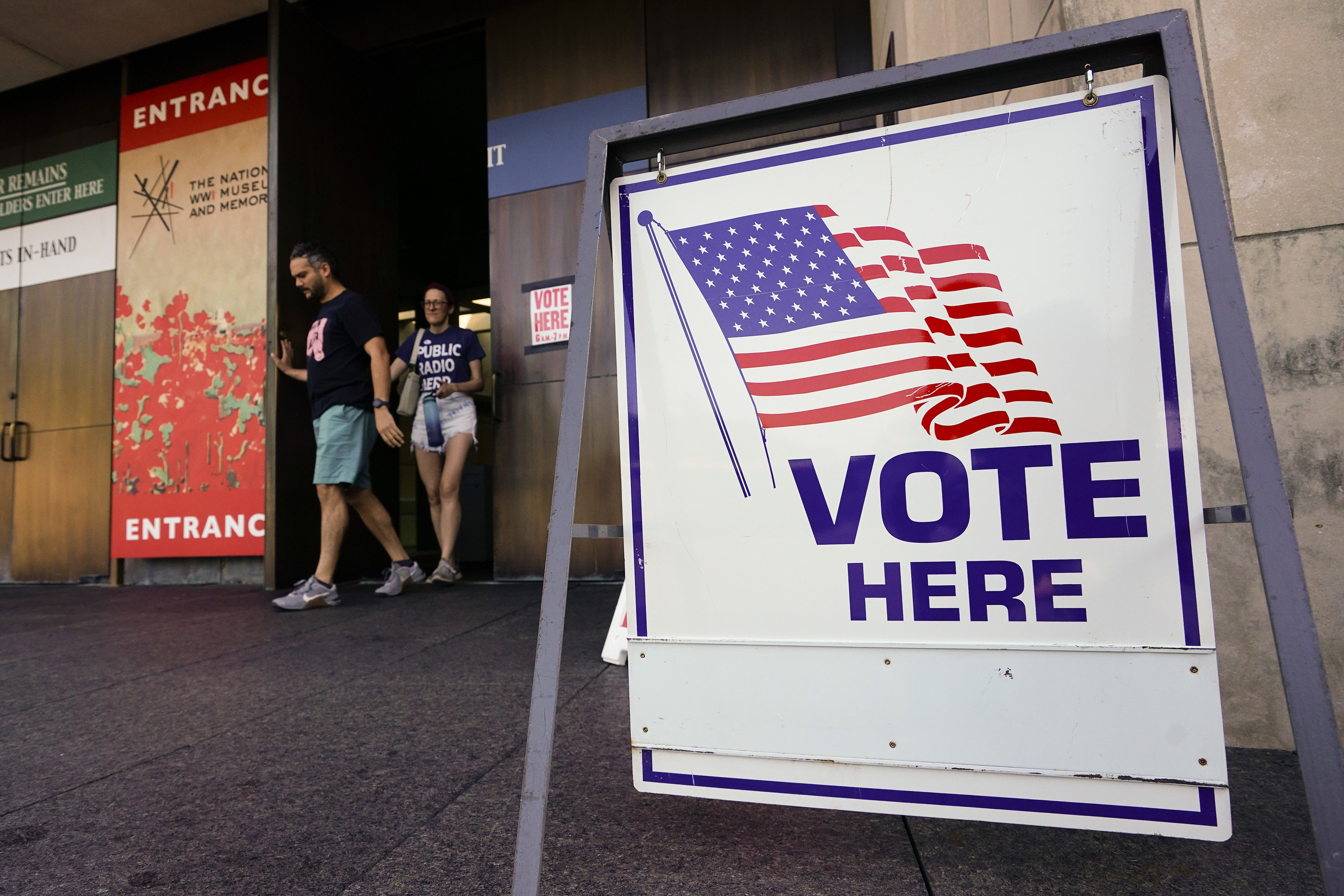
At least eight Republican candidates have attempted to soften their previously extreme positions on abortion and reproductive rights as the midterm elections approach, but strategists say it’s unlikely they’ll convince voters that they really mean it.
Since the Supreme Court overturned Roe v. Wade in June, voter registration has been surging in many states as people who support abortion rights are newly energized. Now, some Republican candidates, including Blake Masters in Arizona, Tom Barrett in Michigan, and Zach Nunn in Iowa, have either removed extreme anti-abortion stances from their websites or publicly walked back their support for banning abortion without exceptions. Though some Republicans are continuing to push to take away access — notably Sen. Lindsey Graham, who introduced a national abortion ban on Tuesday — candidates who are hoping to catch voters seem to be realizing what polling has long shown: Most Americans say abortion should be legal in most or all cases.
“With surging registration and high turnout rates among women producing surprise victories in red states like Alaska and Kansas, and competitive districts like New York 19, the once certain ‘red wave’ in November is much less of a sure bet,” Democratic political strategist Tom Bonier told BuzzFeed News in an email.
“Republicans are unsurprisingly responding by softening their rhetoric and hiding references to anti-choice policies, though it seems unlikely that voters will be fooled.”
More than 50% of voters have said that the issue of abortion would be “very important” to them at the polls this year. As Republican strategist Alex Patton told BuzzFeed News in a statement, “These candidates aren’t stupid.”
“They have seen the results of the special elections. They see women registering to vote, and they see that extreme abortion positions are out of favor.”
It is now “up to voters to determine if their shifts are genuine or a cynical smoke screen,” Patton said, adding it will be difficult to say if voters will buy it. “I lean towards 'voters aren't dumb,' but a lot depends on the opponent's skill.”

Masters, who is running for US Senate in Arizona against Democratic incumbent Mark Kelly, removed his extreme positions on abortion from his website in August, as reported by NBC News.
Before winning the primary, Masters’s website said he was “100% pro-life” and supported a “federal personhood law,” according to NBC News. (A personhood law would grant constitutional protections to fetuses.)
The website now states that Masters supports a “law or constitutional amendment that bans late-term (third trimester) abortion and partial-birth abortion at the federal level,” as well as expressing his support for “pro-life legislation.” Masters’s campaign did not immediately respond to a request for comment from BuzzFeed News.
Congressional hopeful Nunn, who is running in Iowa, also publicly changed his position on abortion. In a primary debate in May, Nunn and his Republican opponents were asked to raise their hands if they thought that “all abortions should be illegal in this country.” He raised his hand. “All abortions, no exceptions, should be illegal?” the moderator clarified. Nunn left his hand up.
Then, just a few months later in mid-August, Nunn published an op-ed in the Des Moines Register stating that he does, in fact, support exceptions for the health of a pregnant person, as well as cases of rape and incest.
“Let me be clear,” Nunn wrote. “I am pro-life and believe life begins at conception. I also believe we must be compassionate toward both women and unborn children.” He added that the proposed six-week ban he supported in the state legislature contained “exceptions for horrific circumstances like rape, incest, and fetal abnormalities, and to save the life of the mother.”
Nunn’s campaign did not immediately respond to a request for comment from BuzzFeed News.

In the last few weeks, Michigan congressional candidate Tom Barrett revised the copy on his website, which previously said that “elected leaders have a responsibility to represent the values our faith teaches,” such as “protecting individual rights includes protecting the unborn.”
Barrett will “always work to protect life from conception,” it used to read, according to an archive of the website.
Now, the abortion section of his website focuses on attacking the stance of his opponent, Democrat Elissa Slotkin. The only mention of Barrett’s personal position states that he “has been a consistent pro-life state legislator.” On Twitter, Slotkin called out her opponent for scrubbing his website, saying that he is “hiding his 100% pro-life stance.”
Barrett’s campaign did not immediately respond to a request for comment from BuzzFeed News.
Other Republicans across the country have made similar moves. In North Carolina, congressional candidate Christian Castelli has changed his website since he was made the Republican nominee, as reported by Fox 8. His website no longer mentions abortion or anti–reproductive rights policies. In Colorado, congressional candidate Barbara Kirkmeyer deleted a statement that listed “defending the sanctity of life” as a priority. Scott Jensen, who’s running for governor in Minnesota, said in March that he would “try to ban abortions” if elected; then, last week, he posted a video saying that because of a previous state Supreme Court decision, the governor does not have the power to act on abortion rights. “It’s protected,” he said.
Christine Drazan, a Republican gubernatorial candidate in Oregon, removed her “issues” platform from her website, which had included anti-abortion statements, according to Axios. In Nevada, gubernatorial candidate Joe Lombardo said in a May primary debate that he would consider banning Plan B. Then, in August, he said he would not block contraceptives after all.
It is not unusual for politicians to pivot their messaging in the months after primary season to appeal to a wider range of voters, Republican strategist Robert Coon told BuzzFeed News. But this year, getting support from independent voters could have a new urgency.
“I think what we’re seeing this cycle is some erosion of support for Republican candidates among independent voters, and more specifically independent female voters, largely related to the Dobbs decision,” Coon said. “Depending on the state or district, even a nominal drop in support from independents can have a significant impact on a campaign’s ability to win.”
But that shift in rhetoric “simply won’t work,” according to Democratic strategist Stacy Pearson. Progressives, libertarians, and women with a variety of political views have come together against candidates with extreme anti-abortion views, more so than other issues.
“There’s no coming back from that.”
